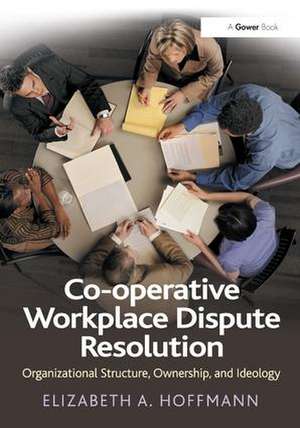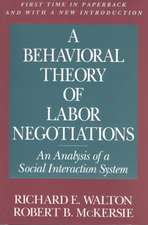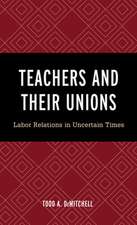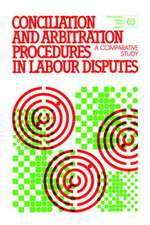Co-operative Workplace Dispute Resolution: Organizational Structure, Ownership, and Ideology
Autor Elizabeth A. Hoffmannen Limba Engleză Paperback – 16 noi 2016
| Toate formatele și edițiile | Preț | Express |
|---|---|---|
| Paperback (1) | 489.26 lei 43-57 zile | |
| Taylor & Francis – 16 noi 2016 | 489.26 lei 43-57 zile | |
| Hardback (1) | 1060.25 lei 43-57 zile | |
| Taylor & Francis – 30 iul 2012 | 1060.25 lei 43-57 zile |
Preț: 489.26 lei
Nou
Puncte Express: 734
Preț estimativ în valută:
93.62€ • 98.01$ • 77.46£
93.62€ • 98.01$ • 77.46£
Carte tipărită la comandă
Livrare economică 07-21 aprilie
Preluare comenzi: 021 569.72.76
Specificații
ISBN-13: 9781138268739
ISBN-10: 1138268739
Pagini: 216
Dimensiuni: 174 x 246 x 12 mm
Greutate: 0.45 kg
Ediția:1
Editura: Taylor & Francis
Colecția Routledge
Locul publicării:Oxford, United Kingdom
ISBN-10: 1138268739
Pagini: 216
Dimensiuni: 174 x 246 x 12 mm
Greutate: 0.45 kg
Ediția:1
Editura: Taylor & Francis
Colecția Routledge
Locul publicării:Oxford, United Kingdom
Notă biografică
Dr Elizabeth Hoffmann is an Associate Professor in the Sociology Department at Purdue University, Indiana, USA. She earned her BA, MS, JD and PhD degrees at the University of Wisconsin-Madison. Her scholarship bridges the areas of work and organizations and law and society. During her academic career, Dr Hoffmann has specialized in sociology of law, women's studies, workplace conflict, and grievance and dispute resolution. Her research has won awards from the Labor and Employment Relations Association, the Upjohn Institute for Employment Research, and the American Bar Foundation. Dr Hoffmann has been visiting faculty and a guest speaker in many places, including, in the UK, the University of Warwick and the London School of Economics. Dr Hoffmann continues her exploration of legal consciousness and dispute resolution in the workplace. Her current scholarship includes examining the implementation of recently passed workplace-focused laws.
Recenzii
’Hoffmann’s fascinating book provides the first comparative study of worker cooperatives and conventionally structured enterprises in similar industries. This unprecedented methodological approach allows Hoffmann to isolate the effects of flattening the hierarchy on a central feature of all organizations-workplace disputes. Her findings are illuminating. Hoffmann discovers, for example, that while members of worker cooperatives generally have more options for resolving disputes than their counterparts in conventional workplaces, power differentials associated with gender and social status do not necessarily disappear in a worker cooperative, meaning women and people from working class backgrounds sometimes face the same kind of difficulties pursuing their grievances they face in the larger society.’ James Tucker, University of New Hampshire, USA ’The book offers useful practical suggestions that can be readily incorporated into all organizations, whether they are conventional or cooperative, large or small, or for-profit or non-profit.’ Labor Studies Journal, vol. 39, no. 4
Cuprins
List of Abbreviations; Acknowledgments; About the Author; Introduction; Chapter 1 What Are Worker Co-operatives?; Chapter 2 What is Workplace Dispute Resolution?; Chapter 3 Three Different Worker Co-operatives; Chapter 4 Mining the Depths of Co-ownership: The Coal Industry; Chapter 5 Legal Consciousness on the Road: The Taxicab Industry; Chapter 6 Loyalty Instead of Leaving: Dispute Resolution in the Organics Industry; Chapter 7 Co-operative Struggles: Struggles Toward the Goal of Equality; Chapter 8 Lessons for the Rest of Us: The Co-operative Landscape;
Descriere
Co-operative Workplace Dispute Resolution focuses on dispute resolution strategies at matched pairs of worker co-operatives and conventional businesses in three different industries. In contrast to conventionally organized businesses, co-operatives attempt to evenly distribute power and ownership and encourage worker control through egalitarian ideologies, flattened management structures and greater information sharing. The author’s research identifies clear variations attributable to different organizational forms and demonstrates that worker co-operative members have access to more dispute resolution strategies than their conventionally employed counterparts. A more even distribution of power, as occurs in co-operatives, provides insight into how greater worker involvement and ownership might function in a less "extreme" and more modest form to the benefit of conventional mainstream business.



























